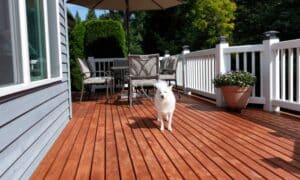Training older dog issues require some adaptability. When you're considering training older dog techniques, you have to keep in mind what senior dog problems your older dog has. Here are some of the training older dog considerations you need to think about:
1. Older dogs may have joint problems. There are some things your older dog isn't going to be able to do. If, for example, you are trying to teach your senior dog to jump up, if your dog isn't doing what you want, it may be because the jump is physically difficult for him because he has older dog joint problems. Even simple tasks like sitting and lying down can be hard for dogs.
Be aware that your older dog might not be responding because of pain or stiffness. Don't get impatient with a slow-to-respond older dog who could have joint problems.
2. Many senior dogs have trouble hearing. Training older dog techniques must take into account the possibility that the dog may have dog hearing loss and not be able to hear commands.
If you're not sure if your older dog has dog hearing loss, do a little experiment. Wait until your senior dog has his or her back to you and then say the dog's name. If your dog doesn't respond, he likely can't hear you.
To compensate for the dog hearing loss, incorporate hand signals into your training. For example, use a “come here” motion when teaching the dog to come. Use a flat hand, palm facing away from you to teach a dog to stay. Point to the floor when you want the dog to sit. Make a motion with your hands like an umpire calling a batter safe when you're telling your dog, no.
You may need to use your hands to give praise too. Most training uses treats AND verbal praise for the best effect. If your dog can't hear the praise you give, it could slow down your training older dog efforts. Choose a hand or body movement that tells your dog you're happy with him.
3. Senior dogs can have bladder control issues. When you're considering potty training older dog techniques, keep in mind that your older dog may have problems with his bladder. The potty training efforts will go more smoothly if you take your dog outside frequently. The fewer accidents you allow, the easier it will be to potty train your older dog.
4. Older dogs can have attention-span issues. You know how people tend to get more child-like when they get older? Dogs do too. They can revert back to some puppy-like qualities. One of those qualities can be a shortened attention span. Good training older dog efforts take this into account.
Teach your senior dog in small chunks of time. A few minutes several times a day is better than one longer block of time.
When you keep these special senior dog considerations in mind, you'll have far better results when you set out to succeed at training older dog.





